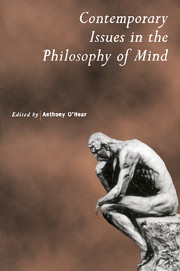Book contents
- Frontmatter
- Contents
- Notes on Contributors
- Introduction
- The Mind–Body Problem After Fifty Years
- How to Find the Neural Correlate of Consciousness
- Embodiment and the Philosophy of Mind
- Folk Psychology and Mental Simulation
- Understanding Other Minds from the Inside
- Self-knowledge: the Wittgensteinian Legacy
- Joint Attention and the First Person
- Consciousness as Existence
- Setting Things before the Mind
- Perceptual Intentionality. Attention and Consciousness
- Experience and Reason in Perception
- Intentionality as the Mark of the Mental
- Intentionality and Interpretation
- Externalism and Norms
- Mind, World and Value
- Mind, Knowledge and Reality: Themes from Kant
- The Modality of Freedom
- Dualism in Action
- Index
Intentionality and Interpretation
Published online by Cambridge University Press: 12 May 2010
- Frontmatter
- Contents
- Notes on Contributors
- Introduction
- The Mind–Body Problem After Fifty Years
- How to Find the Neural Correlate of Consciousness
- Embodiment and the Philosophy of Mind
- Folk Psychology and Mental Simulation
- Understanding Other Minds from the Inside
- Self-knowledge: the Wittgensteinian Legacy
- Joint Attention and the First Person
- Consciousness as Existence
- Setting Things before the Mind
- Perceptual Intentionality. Attention and Consciousness
- Experience and Reason in Perception
- Intentionality as the Mark of the Mental
- Intentionality and Interpretation
- Externalism and Norms
- Mind, World and Value
- Mind, Knowledge and Reality: Themes from Kant
- The Modality of Freedom
- Dualism in Action
- Index
Summary
According to Brentano in a much-quoted passage,
Every psychological phenomenon is characterized by… intentional inherent existence of … an object… In the idea something is conceived, in the judgement something is recognized or discovered, in loving loved, in hating hated, in desiring desired, and so on.
This is a doctrine about the nature of thought or cognition, and some would say that the matters it raises have only fairly recently come to be directly engaged by mainstream philosophers of the analytical tradition. For analytical philosophy's approach to the question of intentionality has tended to be routed through concern with linguistic behaviour, its interpretation and its logical and semantic analysis. The depth of this concern with language is, if anything, emphasized when we consider more recent attempts by heirs of the analytical tradition to approach the question of intentionality more directly, missing out the trip through linguistic behaviour. According to one very influential version of this tendency, the problem of intentionality is still to do with the properties of linguistic structures, only now not public, spoken linguistic structures, but systems of mental representations in the brain. The tendency to miss out the trip through public language reflects, in part, a reaction against behaviourism and in favour of mentalism: just as one of the principal causes for the longevity of the result of the ‘linguistic turn’ was undoubtedly the influence of behaviourism on analytical philosophy of mind.
- Type
- Chapter
- Information
- Contemporary Issues in the Philosophy of Mind , pp. 253 - 272Publisher: Cambridge University PressPrint publication year: 1998
- 2
- Cited by

